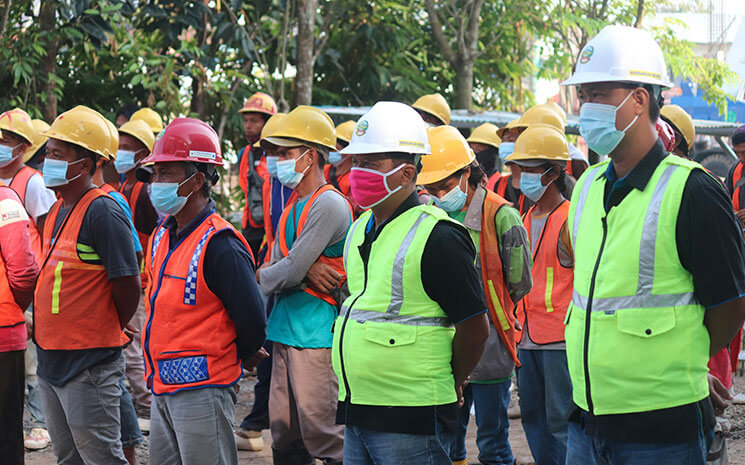How Can We Help?
If you need any help, please feel free to contact us.
8722-3409 / 8722-9737
fpi@fpi.ph

Labor and Productivity
Understanding the Federation of Philippine Industries’ (FPI) advocacy on labor and productivity requires looking at the broader context of Philippine labor and economic development.
FPI’s advocacy aims to create a labor environment that supports industrial growth, enhances productivity, and ensures the competitiveness of Philippine industries in the global market.
Regarding legislated wage hike, however, the Federation greatly appreciates the noble intention for legislated wage hike, however, we humbly manifests our vehement opposition of a legislative wage hike for the following grounds:
- Companies in the same industry are not similarly situated because of the difference in terms of capitalization, location, machinery, workforce, among others. In fact, some are earning, while the others are really losing and to legislate a wage hike that will affect all of them will not only deprive them to recover, but, they could even go to jail in view of the criminal liability provision therein.
- Most of our members have existing Collective Bargaining Agreements (CBA) which were voluntarily agreed upon by the employers and its employees in accordance with the prevailing condition known to the parties in the respective companies.
- Smuggling must be stopped. The unabated smuggling is costing government more than PhP250Billion revenue loss in terms of unpaid taxes and duties, annually. It is continuously causing the influx of substandard/cheap smuggled goods which are unfairly competing with locally manufactured products (that regularly pays taxes) that already resulted in company closures and loss of jobs.
- Using various econometric methods, a study finds that the minimum wage policy reduces employment in small firms. It causes small firms to reduce their production workers. The negative impact of minimum wages emanates from scale effects. Because of greater marginal costs, it is difficult for small firms to mature into larger-scale firms. In the process, the production and the demand for production workers decline. With the decline of small-scale firms, larger firms are able to acquire more production workers, presumably at starting wages lower than what experienced workers would have received in smaller firms. These firms are not able to rehire all the laid-off workers, and the poorer workers who may need cash in the short term may find these arrangements inferior to their previous jobs.
Furthermore, because of the minimum wages, firms are reluctant to hire younger, less educated and female production workers. To minimize costs, increasing training for these younger and less educated production workers may no longer be an option as minimum wages rise. These findings may have serious consequences in the way the Labor Code affects production efficiency, as well as social protection. There is thus a need to coordinate these policy areas in a way that reinforces one another.
- Raising the minimum wage, however, is a formula for causing unemployment among the least-skilled members of society. The higher wages are, the higher costs of production are. The higher costs of production are, the higher prices are. The higher prices are, the smaller are the quantities of goods and services demanded and the number of workers employed in producing them. These are all propositions of elementary economics that all educated citizens and political leaders should well know.
- Government, with all due respect, must focus instead on the generation of employment as well as maintaining the security of existing jobs.
- Moreover, our Regional Wage Boards are in place where the employer, labor, and government are duly represented, – that could readily determine the reasonable minimum wage taking into consideration the standard of living in the different regions as well as the actual employer-employee condition therein in relation to the market. Hence, they are better equipped and have a better understanding of the situation on the ground. And,
- Finally, the granting of a legislated wage increase might even affect the loyalty of the employees toward their employers, which good relationship they have both long nurtured.
Achievements:
FPI, labor and academe, tripartite partnership
- The Philippine Labor Social Partnership Inc. (PELSPI) was organized by both employers and labor on January 30, 2007 to uphold the mission and vision of harmonizing the relationship and strengthening the cooperation between the industrial and the labor sector for the betterment of our society. UP SOLAIR took active part in this endeavor.
FPI pushed for the harmonization of human resources requirement of the industry;
- FPI-UE and FPI-TESDA MOUs were executed with the end in view that – 1) the converging intent of both the objective is to harmonize the human resources requirements of the industry, i.e., the office and the shopfloor based personnel, with that of the graduates of the country’s tertiary and vocational/technical educational institutions, and 2) the undertaking encompasses not only the concern of the quality of education and the marketability of new graduates, but also of policies regulating and overseeing the changes in the school’s curriculum, on two levels the FPI had entered into two Memorandum of Understandings (MOUs) with the University of the East (UE) and Technical Education and Skills Development Authority (TESDA).
FPI’s active involvement and contribution in labor issues have been recognized by the government.
- Chairman Jesus Lim Arranza was appointed as one (1) of the three (3) representatives in the independent review panel of the Technical Education and Skills Development Authority (TESDA).
- Atty Rufino M. Margate, Jr., was appointed as one of the employer representatives in the National Tripartite Industrial Peace Council (NTIPC).
- Mr. Peter Quintana was appointed as employer representative in the National Capital Region.



